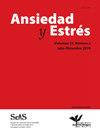Efectos del estrés agudo en la ingesta de alimentos en estudiantes universitarios emocionalmente sanos
IF 0.5
Q4 PSYCHOLOGY, CLINICAL
引用次数: 1
Abstract
Introduction and objective: This study aimed to examine the relationship between acute stress and food intake using a sample of people without emotional disturbances. In order to manipulate the stress and evaluate the aforementioned relationship, an experimental scenario was designed, through a version modified of the Social Stress induction protocol, Trial Stress Social Test (TSST). Material and methods: The final sample included 82 participants between the ages of 18 and 30 years, who were randomly assigned into two groups. Participants attended two sessions. In the beginning, they answered questionnaires that gathered information about: stress to guarantee the equivalence of the groups before any exposure to the experiment. In the second session, for each activity associated with the TSST protocol, the perceived stress was evaluated. Also, the food intake was evaluated. For the analysis, six covariates were statistically controlled: age, sex, BMI, emotional eating, food restriction and food craving. In addition, food intake was evaluated with the category: quantity of unhealthy food. Results: Through logistic regression analysis, it was found that, under acute stress conditions, a healthy person might have a higher intake of unhealthy food. Conclusions: Theoretical and practical implications of the results contribute in developing future research in the field of study.急性压力对情绪健康大学生食物摄入的影响
简介和目的:本研究旨在研究急性压力和食物摄入之间的关系,使用无情绪障碍的人作为样本。为了操纵压力和评估上述关系,我们设计了一个实验场景,通过社会压力诱导协议的修改版本,试验压力社会测试(TSST)。材料和方法:最终样本包括82名年龄在18至30岁之间的参与者,他们被随机分为两组。与会者出席了两次会议。一开始,他们回答问卷,收集有关压力的信息,以确保在任何接触实验之前各组的等效性。在第二阶段,对与TSST方案相关的每个活动进行感知压力评估。同时,对食物摄入量进行了评估。在分析中,统计上控制了六个协变量:年龄、性别、身体质量指数、情绪性饮食、食物限制和食物渴望。此外,食物摄入量的评估类别:不健康食物的数量。结果:通过logistic回归分析发现,在急性应激状态下,健康人不健康食品的摄入量可能更高。结论:本研究的理论和实践意义有助于本研究领域的进一步研究。
本文章由计算机程序翻译,如有差异,请以英文原文为准。
求助全文
约1分钟内获得全文
求助全文

 求助内容:
求助内容: 应助结果提醒方式:
应助结果提醒方式:


